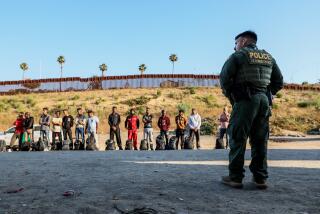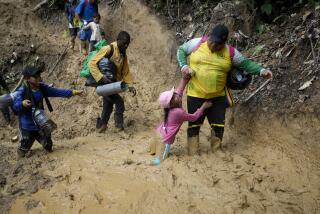Single Parent, Bringing Kids? Check Out the Paperwork
- Share via
Any single parent who plans to take children on a foreign trip probably expects to face a challenge or two. But here’s one that many parents may not have considered: paperwork.
With an estimated 9 million single-parent households in the U.S., it’s likely that thousands of lone parents are heading off on trips with their kids every month, not to mention legal guardians or other adults traveling with children for various other reasons. But many of these travelers don’t realize that if a child is under 18, is traveling without one or both parents, and doesn’t have identification and papers to help explain why, there could be trouble waiting at the first international border.
The aim of such requirements is to block runaways and abductions, particularly actions taken by defiant parents in child-custody disputes. Officials say such cases seem to be on the rise, and border officials around the world have responded by more closely scrutinizing incomplete families. In Canada: Customs and immigration officials recommend that if a child younger than 16 is not accompanied by both parents, the child’s accompanying adult should be able to present not only proof of citizenship for everyone traveling, but written authorization from the absent parent or parents, or a supporting court custody finding.
As in other countries, the process leaves much judgment in the hands of customs officials and the Royal Canadian Mounted Police, who may wave through a group after a few quick questions, or act with much more deliberation if something raises their suspicions. In those cases, missing paperwork can lead to prolonged questioning, phone calls to missing parents and sometimes substantial delays.
In extreme cases of missing information, travelers may be denied entry into the country. And occasionally, legal measures go even further. Since 1985, Canadian authorities say, their customs and immigration officers have helped recover more than 450 runaways and abducted children.
In Mexico: Consulate officials say that in addition to proof of citizenship, all children under 18 who are traveling alone, with one parent or in someone else’s custody should have notarized letters of consent from the absent parent or parents. The only exceptions are cases in which a lone parent can produce legal proof (typically a notarized sole-custody ruling or a death certificate) that the other parent is dead or not entitled to custody.
“It can be a huge problem” if travelers neglect that paperwork, says Alaska Airlines spokesman Jack Evans. Evans estimates that the carrier turns away about three Mexico-bound travelers per month for lack of proper papers.
In cases of minors traveling alone, airlines require the name, address and phone number of the person meeting the minor on arrival in Mexico.
The runaway-and-abductions issue has arisen “more and more often” in recent years, says Robin Neville, a spokeswoman for Canadian Customs Border Services. Her office offers a set of guidelines, paraphrased here, that single parents and others should consider no matter which country they’re planning to visit.
* Always carry identification for yourself and the children.
* If you are a single parent, have copies of relevant legal documents, such as custody rights.
* If you are not the legal guardian of a child, carry a letter authorizing you to have custody. If you’re a parent and legal guardian, but you’re taking a child across international borders without the other parent or custody papers, you, too, should carry a letter of permission from the child’s other parent or legal guardian. Whenever possible, those permission letters should contain specifics of travel (dates and flight numbers, for instance) as well as telephone numbers for the legal guardian or parent.
* If you’re traveling in a group of vehicles, be sure that you are in the same vehicle as your child or children when you arrive at the border.
* Have your child or children memorize your telephone number (or numbers).
In a March survey of foreign countries’ entry requirements, the U.S. State Department reported that Australia and Colombia also ask for documents to cover the travel of minors who aren’t accompanied by both parents. (Other countries’ policies generally are less demanding but were not detailed in the survey.) The State Department’s 20-page “Foreign Entry Requirements” survey can be ordered for 50 cents from the government’s Consumer Information Center, Pueblo, Colo. 81009.
Foreign-entry requirements also are available through recordings on the State Department’s Citizens Emergency Center line (tel. [202] 647-5225).
However, travelers should bear in mind that policies are always evolving. To be safe, parents, guardians and chaperons always should seek up-to-date requirements from foreign government’s embassies or tourist offices before traveling with a child. (The U.S. State Department’s Web page, https://travel.state.gov, also allows access to a list of foreign government contact numbers.)
Reynolds travels anonymously at the newspaper’s expense, accepting no special discounts or subsidized trips. He welcomes comments and suggestions, but cannot respond individually to letters and calls. Write Travel Insider, Los Angeles Times, Times Mirror Square, Los Angeles 90053 or e-mail chris.reynolds@latimes.com.
More to Read
Sign up for Essential California
The most important California stories and recommendations in your inbox every morning.
You may occasionally receive promotional content from the Los Angeles Times.











